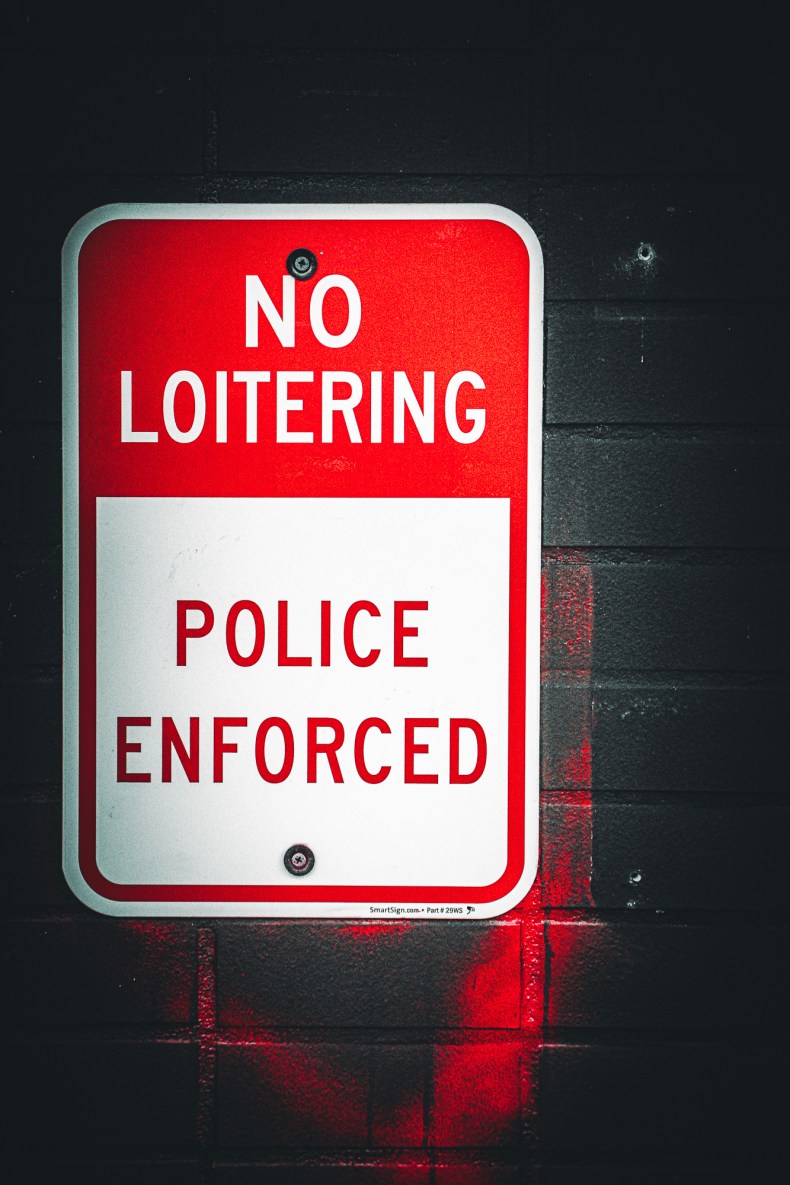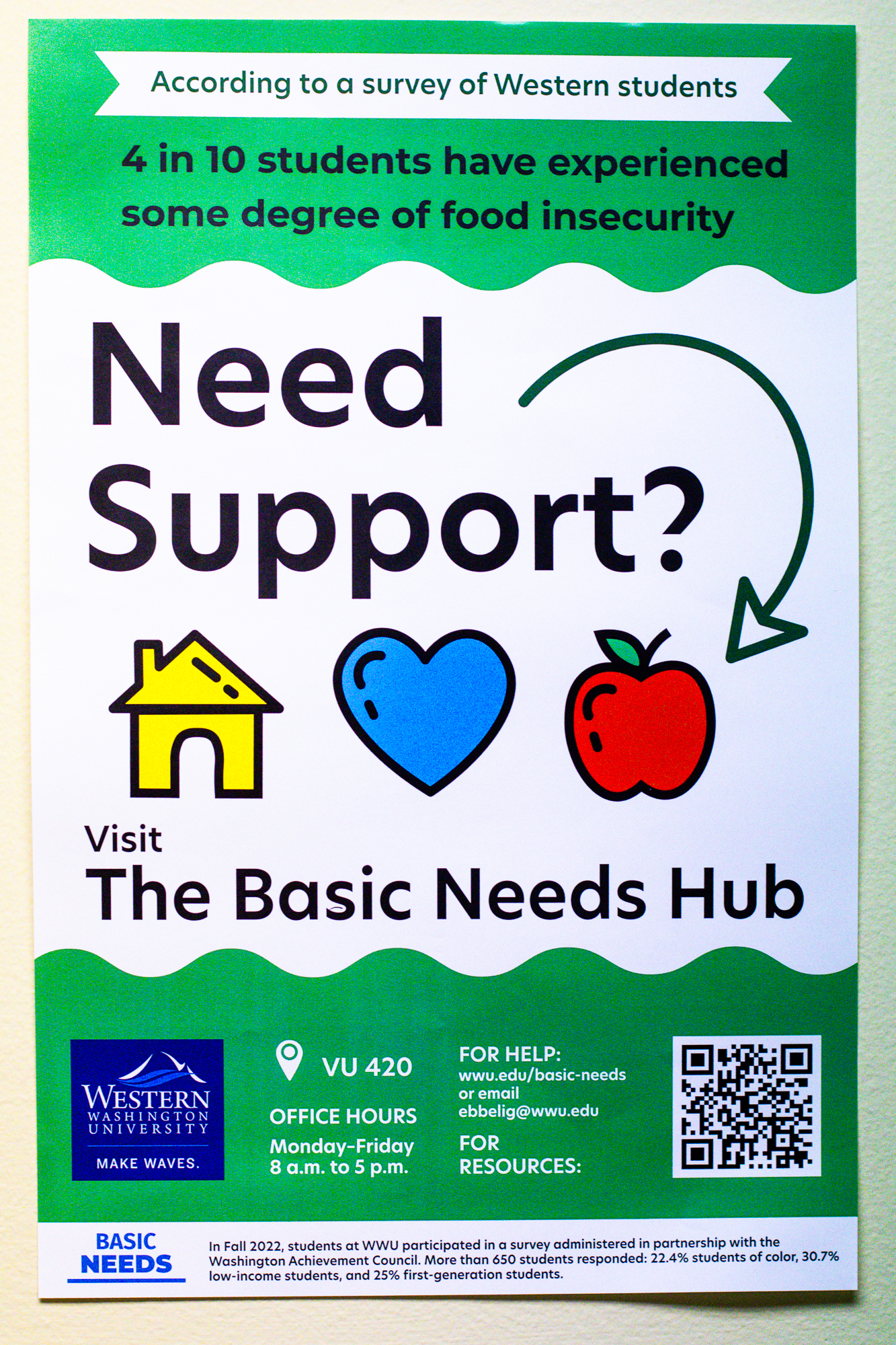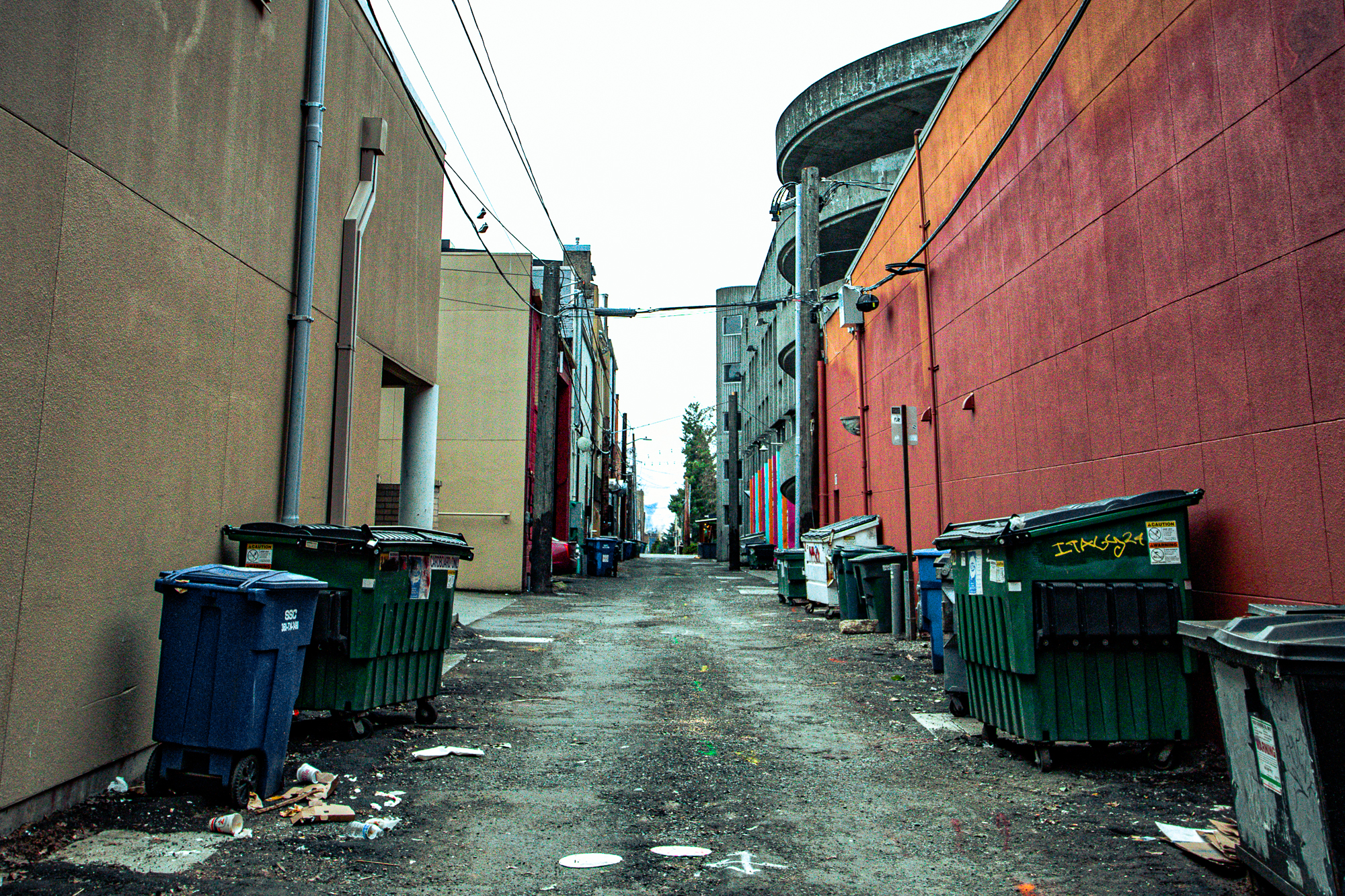By: Kaeson Warnes
If you were struggling to meet your needs, where [on campus] would you turn to first?
Student: “I have no idea.”
Nearly half of all college students in Washington experience basic needs insecurity1. Your friend, your classmate, or even your needs may not be currently met. The Washington Student Achievement Council defines basic needs as being anything a student requires to live successfully: access to food, shelter, healthcare, childcare, internet, and more1. According to the Washington Student Experience Survey, students who are unable to meet their basic needs struggle to thrive academically, leading to decreased retention during learning and increased risk of dropout1.
Even more concerning, rates of need insecurity skyrocket when observing specific student groups compared to their peers; especially Black and African American students, American Indian and Alaska Native students, students with disabilities, LGBTQ+ students, low-income students, and students with dependents1,2. Oftentimes these students reach levels of crisis before they find help, leaving them nowhere left to go.

A red and white sign reading, “No Loitering. Police Enforced.” On the wall below is a spray-painted red X. Kaeson Warnes // Wavelength
With such high numbers, wouldn’t you think that those holding power in Washington state would be more vocal about this issue? Shouldn’t we be hearing more about the college needs epidemic? State universities like WWU have begun to implement vital resources that work directly with the community to uplift students and help meet their needs. These resources have faced significant barriers when receiving state funding and recruiting knowledgeable employees, but they are attempting to provide help to the students that need it most.
Even then, students are afraid to reach out for help. The “starving student” trope dominates students’ stomachs and minds. Society tells us that our struggles are expected during this time in life, and that asking for help will result in backlash and disappointment from peers. Students feel they cannot take from these services because they aren’t in a position where they feel their challenges are valid—even though they deserve support. The simple fact is that students do not know that these services exist specifically for them until it’s far too late. When interviewing WWU students about their experiences with basic needs insecurity, one individual professed, “It’s daunting to ask for any help—for anything… I know they’re trying but it all feels daunting.”
Gina Ebbeling is the first point of contact for those on campus experiencing challenges related to basic needs. As the Basic Needs Resource Manager, she said she has witnessed the widespread impact that basic needs insecurity has on students within our community. When asking her what we must do to normalize student needs and make these resources well-known, she explained:
“I’ve been trying to focus on a lot of outreach. Starting with staff and faculty; getting into staff meetings and in front of supervisors to share these resources. Getting in front of student groups and student leaders on campus. I’ve been invited to a few classes which have been great. All kinds of things. Updating our Basic Needs website to make sure that emergency housing—which just got added today—is right on the main page so students can see it. Just getting out into a lot of spaces, which is a little tricky because it’s just me in this role. I envision in the future having more students, like a student advisory group, or student staff…just more people to really serve students and do outreach. But it’s just getting into all the right places.”

An apartment complex featuring a blue “Now Leasing” sign on the outer railings. Kaeson Warnes // Wavelength
And yet, even students who are aware of the resources on campus still struggle. The cost of living has skyrocketed over the past decade, and we cannot keep up. Students are left to choose between food, rent, and tuition—some students even being forced to turn to full-time work while forfeiting their financial aid opportunities. From 2022 to 2023, Whatcom County observed a 27% increase in houselessness across all demographics (the highest number since counting began in 2008), reflecting the fact that individualized need is no longer being met by local services in our area2. This burden falls unfairly on students as they navigate what already is one of the most stressful and confusing times in life. Students who reach out for help before reaching crisis levels are left disappointed and underserved:
“I live with 4 other people, and it’s not too bad, but they keep raising [rent] every year. I agreed for one more year of payment, but this year they’re raising it again, and I’m going to have to move out…”
Do you have a plan for where you’re going to go after this?
“Oh no. Hell no. It’s stressing me out so bad.”
“I’m tired of blowing a bunch of money on food that isn’t even good.”
“I just don’t get why they feel entitled to be charging as much as they are when we’re already paying to be here.”
“I do go to the food pantry sometimes. [I’m] vegetarian and I try to leave behind the gluten-free stuff and the vegan stuff for people who need it… I just saw the Miracle Food Network stopped serving on Monday’s…which is going to make me not want to go even more. A lot of the time the stuff is stale and there’s stuff that’s been expired for months, which I know isn’t the school’s fault, but if you’re trying to be accessible then provide viable, consumable things.”
In times like these, where it doesn’t feel like there’s a clear solution, it’s hard to not feel hopeless and defeated. However, we know that change is not impossible. Steps are being taken to address student needs before individuals reach levels of crisis. There are people that are passionate and hard at work tackling this issue, and they’re making measurable progress while doing so. To revisit my conversation I had with Gina Ebbeling, she offers:
“If resources are more accessible, it’s easier for a student to find it rather than have to ask three or four people and have to state their story over and over before they get to the right person for help… Since I’ve been at Western, I see there are so many pockets of people—whether it’s within academic departments, offices, student clubs, and classrooms—like a lot of people are talking about food insecurity and they’re talking about basic needs in these small circles. And a lot of people doing really cool work around it. It tells me that it’s on people’s minds…It’s just; how do we collaborate on it? It’s hard work…
If you feel like you live in a caring community, we’re going to want to know how our friends are doing and what their needs are.”
If you are in need, you are not alone. Everyone deserves support during this time. Linked is the website for the Basic Needs center, where you can find further information about the resources available to you on- and off-campus: Basic Needs- Office of Student Life.


Basic Needs Resources tied to the university. [Left] A green and white poster advertising information for the Basic Needs Hub. It reads, “According to a survey of Western students, 4 in 10 students have experienced some degree of food insecurity. Need Support? Visit the Basic Needs Hub.” [Right] A view of the doorway of VU 420, the Basic Needs Hub. Immediately inside the door is the office for Off Campus Living. Kaeson Warnes // Wavelength
References
- Washington Student Achievement Council. (2023) Basic needs security among Washington college students. https://wsac.wa.gov/sites/default/files/2023.BasicNeedsReport
- A Home for Everyone: 2023 Whatcom County Annual Report on Homelessness. Whatcom County. (2023, June 13). https://www.whatcomcounty.us/DocumentCenter/View/75702/2023-PIT-Count-Report?bidId=

